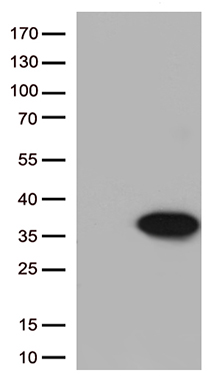Bcl x (BCL2L1) Mouse Monoclonal Antibody [Clone ID: OTI4A9]
CAT#: TA500097
Anti-Bcl-XL mouse monoclonal antibody, clone OTI4A9 (formerly 4A9)
Size: 30 ul
Formulation: Carrier Free
USD 823.00
USD 436.00
Specifications
| Product Data | |
| Clone Name | OTI4A9 |
| Applications | IF, IHC, WB |
| Recommended Dilution | WB: 1:200 - 1:1000, IF (1:100) |
| Reactivities | Human, Mouse, Rat |
| Host | Mouse |
| Isotype | IgG2a |
| Clonality | Monoclonal |
| Immunogen | Recombinant fragment expressed in E.coli corresponding to amino acids 1-212 of human Bcl-XL |
| Formulation | PBS (pH 7.3) containing 1% BSA, 50% glycerol and 0.02% sodium azide. |
| Concentration | 0.25 mg/ml |
| Purification | Purified from mouse ascites fluids or tissue culture supernatant by affinity chromatography (protein A/G) |
| Conjugation | Unconjugated |
| Storage | Store at -20°C as received. |
| Stability | Stable for 12 months from date of receipt. |
| Predicted Protein Size | 25.9 kDa |
| Gene Name | BCL2 like 1 |
| Database Link | |
| Background | Bcl-XL belongs to the BCL-2 protein family. BCL-2 family members form hetero- or homodimers and act as anti- or pro-apoptotic regulators that are involved in a wide variety of cellular activities. The proteins encoded by this gene are located at the outer mitochondrial membrane, and have been shown to regulate outer mitochondrial membrane channel (VDAC) opening. VDAC regulates mitochondrial membrane potential, and thus controls the production of reactive oxygen species and release of cytochrome C by mitochondria, both of which are the potent inducers of cell apoptosis. Two alternatively spliced transcript variants, which encode distinct isoforms, have been reported. The longer isoform acts as an apoptotic inhibitor and the shorter form acts as an apoptotic activator |
| Synonyms | Bcl-X; BCL-XL/S; BCL2L; BCLX; PPP1R52 |
| Reference Data | |
| Protein Families | Druggable Genome, ES Cell Differentiation/IPS, Transmembrane |
| Protein Pathways | Amyotrophic lateral sclerosis (ALS), Apoptosis, Chronic myeloid leukemia, Jak-STAT signaling pathway, Pancreatic cancer, Pathways in cancer, Small cell lung cancer |
Documents
| Product Manuals |
| FAQs |
| SDS |
Resources
| Antibody Resources |
{0} Product Review(s)
Be the first one to submit a review






























































































































































































































































 Germany
Germany
 Japan
Japan
 United Kingdom
United Kingdom
 China
China











